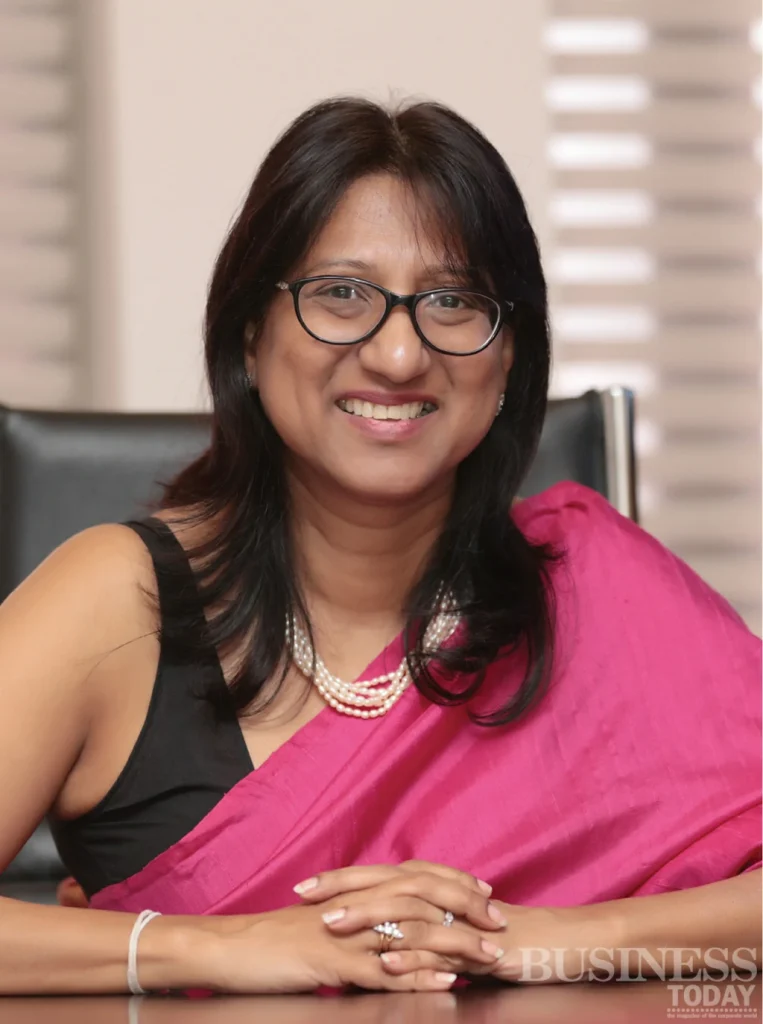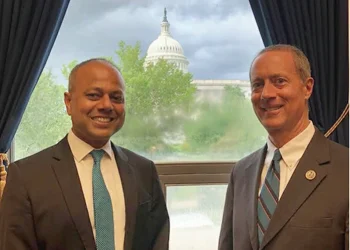
Nations Trust Bank (NTB) has been consistently recording solid performances with strong growth in both momentum and revenue. Despite being a young Sri Lankan bank, NTB has established itself as a major player in the banking sector by adopting a customer-centric approach, a must-do mantra and capitalising on its strengths. Today, Nations Trust Bank is a leader in consumer banking and through the implementation of lean processes and innovative technology such as FriMi and Nations Open API Banking, the Bank is significantly ahead of its Sri Lankan peers in terms of Digital Banking. Renuka Fernando, Director/CEO of NTB, is an innovative and inspiring trailblazer in her own right. She is one of a handful of female corporate leaders in Sri Lanka and is confident about the Bank’s position.
By Udeshi Amarasinghe and Keshini De Silva
Photography Mahesh Bandara
Could you elaborate on the performance of the Bank during the past year?
Performance in 2018 has been mixed. On the positive side, the growth momentum has continued and we have made headway in terms of our core operational income. The ‘Nations Trust idea’ is to always capture market share and deepen our client’s wallet size. Therefore, we are not only focused on increasing our client base, but also deepening our relationship with the client. Over the last few years, we have invested a lot of time in deepening those relationships by looking at the entire ecosystem of our customer and growing with the client. This means looking at the employees, retailers, distributors and suppliers of our client and then working towards intensifying relationships horizontally and vertically and this has paid dividends for us. We have seen that our revenue has performed well this year where Fees and NII are good. We have also taken a lot of initiatives in terms of efficiencies within the Bank which has brought cost efficiencies. We adopted lean processes about four years ago and are now reaping the benefits as it takes at least four to five years before those concepts are really integrated into the organisation. We are also further automating our processes. So overall, in terms of the core business, we are doing well.
In The Last Three Or Four Years, We Focused On Increasing Revenue And Building Relationships With Existing Customers.
However, on the other side of the coin, the market is very tight. There are many customers, especially in the Small and Medium Enterprises (SME) sector, who are facing great difficulties. These are of course economic cycles that we go through. There is a lot of cash flow crunch in the market due to non-payment by debtors or delayed payments. As a result, our impairment has increased, both in the consumer and SME sectors. Impairment this year is also impacted by IFRS 9 (International Financial Reporting Standard). The methodology requires impairment to be frontloaded rather than calculated over a period of time, which means future impairment possibilities are also taken into account. So, whilst we are doing well in terms of revenue and managing costs, impairment has hit us. But from an overall profit point of view, our first half performance is quite good.
Going forward, what are the strategies in place and new initiatives taken?
In the last three or four years, we focused on increasing revenue and building relationships with existing customers. This has received a lot of traction and the businesses are doing well. Therefore, from credit cards, to leasing, to SMEs, to corporate business and to trade, we have continued to devote more resources to this effort over the last two years.
Nations Trust Bank is a customer-centric organisation with a vision to help people and businesses achieve today’s goals and tomorrow’s aspirations. We sincerely believe in this vision, and thus we want to bring benchmark for customer experiences to the market. A key to achieving this objective is by redesigning our processes, to create a simple, easy and frictionless delivery for the customer. This is not easy because we are a heavily regulated industry. It is possible with technology advancement and automation, which are key to better customer delivery, interactions and servicing.
Since end 2017, we have begun robotic process automation, which is great for repetitive banking transactions, resulting in better delivery times and increased accuracy as human error is eliminated. Thus, robotic process automation is an on-going effort and has already and will continue to enhance customer experience.
We are also expanding automation within the organisation, to ensure manual intervention is reduced as much as possible and that paper-waste is reduced, resulting in faster and easier banking experience. Going further, we are looking at implementing an enterprise-wide, seamless customer relationship management system that will amalgamate customer information from across the organisation in one place so that we can deliver seamless personalised banking experiences. Whether a customer is accessing our services physically or digitally through an ATM or Mobile or Online Banking, the experience must be an Omni-Channel one. This is what we’re trying to do. We are determined and are investing heavily in technology and other resources to provide that experience.
Our Aim Is To Make Nations Trust Branches The Customer Relationship Point Of Contact, While Serving Our Customer’s Day-To-Day Transactional Requirements Primarily Through Digital Channels.
The future is also about efficiency within the organisation. We have recorded a good cost-income ratio thus far, but we believe it can be brought down further and in the future our objective is to be less than 40 per cent. As we grow, automation will play an increasingly large role within the organisation and serve to increase efficiency. We are also looking at concepts such as activity based costing for the organisation which will help us to understand and attack inefficiencies.
Today, nearly 60% of our customer initiated transactions are on digital channels. But this does not mean the branch is redundant. The branch is likely to remain for the foreseeable future, because the human element is still very important for banking. You may not visit a branch for transactions, but a physical contact point is essential in terms of financial products, relationships and investments. Therefore, we are transforming our branches to be less transaction-focused and more centred on spending time with the customer. Our aim is to make Nations Trust branches the customer relationship point of contact, while serving our customer’s day-to-day transactional requirements primarily through digital channels.
On the innovation side, for the next couple of years, we will be focusing on enhancing FriMi the first Digital Bank in Sri Lanka, which is steadily gaining traction. We are looking forward to the adoption of eKYC (Know Your Customer) in Sri Lanka and have planned many innovative technologies and have shared some of our ideas with the Government. We believe it’s an important step for Sri Lankan banks. This would mean greater customer inclusiveness, as you can reach any customer in Sri Lanka without a branch network, with much lower costs and much better customer experiences.
Nations Trust Bank is a relatively young bank in Sri Lanka, can you elaborate how Nations Trust bank is facing up to the challenge?
We don’t use the word ‘challenge’ in the organisation. We have said there are no ‘buts’ and no ‘cant’s’. In our organisation everything is ‘can’ or ‘must-do’. Whether it is the economy, regulations, or any other issue, we make our business to be able to predict future hurdles and find ways around them. When compared to our peers, we understand that size is not our strength. We are a medium-sized bank. Our strength lies in our ability to shine in our own chosen segments.
We do have a nationwide presence but have a strong presence in the Western, Central, Southern and North Western Provinces, which is where we have been strong historically. Although we started off as a consumer bank, we have moved into the SME sector a few years ago which has grown at a remarkable pace and can hold their own against any competitor.
Today, we are number one in terms of credit cards in Sri Lanka and we are strong in our consumer business, which is what we started with initially. When we started we were the first Sri Lankan bank to bring a consumer model to Sri Lanka. On the corporate side too, we are quite strong today. We have also moved into syndications and project finance and are strong in the market.
I believe there is a philosophy at Nations Trust where if we undertake something, we have to be the best at it or at least in the top three. We do not venture into products and services where we lack the ability to become strong over a period of time. Hence, in all our verticals we are comparative to the rest of the industry.
In terms of digitisation and technology, we believe that we have had a head start with FriMi. We were the first bank to introduce a complete digital proposition to the market and we have gained great traction. This proposition offers a bank account, all banking transactions you can normally do, a payment platform and QR-code based money transfers that nobody else can offer. For example, if you have FriMi and want to transfer money, but do not have the receiver’s bank account number, all you need is their mobile number to make the transfer from anywhere in the country. The receiver gets a cash token which he can encash at any Nations Trust ATM and withdraw the money. No one in this country offers this facility through a bank account. We have long been pioneers of such innovation.
More recently, we became the first bank in Sri Lanka to introduce Open API Banking, which means our core systems can be integrated with third party system of our customers. We are the first bank in Sri Lanka to offer this. We see huge potential in Open API Banking and are now implementing greater infrastructure to support this service, particularly to our corporate clients.
In terms of being ahead of the market, how has the customer responded to such initiatives?
The response to both FriMi and Open API has been excellent. FriMi was initially an idea that we had for a digital proposition for the younger generation. At the time, we were very strong on the 30 to 65 age group, but were not catering to the younger demographic – from the first job to the age of 30. That generation does not even like the word ‘bank’ nor do they like to visit a bank. The idea was to introduce a completely digital proposition that appealed to this generation. But FriMi has become loved not just by the younger demographic but also by other age groups who appreciate the added convenience. We see increases in volumes literally every day.
In Terms Of Digitisation And Technological Implementation, We Believe That We Have Had A Head Start With FriMi. We Were The First Bank To Introduce A Complete Digital Proposition To The Market.
Open API Banking has seen a massive response as many start-ups and individuals who found it difficult to introduce proper payments systems for their ventures have turned to us for this service. For large corporates, the Open API Banking provides the ability to directly integrate their payments systems with our own systems, streamlining processes as well as increasing efficiency.
A great example of Open API Banking is the direct integration of FriMi at Keells Supermarkets. Through Open API Banking, we have now directly integrated FriMi to the Keells electronic cash register, enabling clients to handle payments from your bank account to Keells directly using your mobile phone.
In terms of Nations Trust Bank being the sole acquirer and an issuer for American Express credit cards, what has been the experience?
While we are no longer the sole issuer of American Express in Sri Lanka, but we are still the sole acquirer for American Express. Our Cards business is one of the major drivers of revenue and profitability at Nations Trust Bank and we have learnt a lot from American Express over the years. We have toiled to establish one of the best acceptance networks for American Express world-wide outside of the USA and we are extremely proud of this. In many markets, American Express acquirers have not been able to penetrate as deeply as we have done in our country and therefore, this is one of our big success stories.
In terms of issuing, we still remain the single largest issuer of credit cards in Sri Lanka with American Express pitched as a travel and high-end card but we have also entered the mid-market segment. We were the last to enter the cards business, as every other bank offered credit cards when we entered the market fifteen years ago. But today, we have beaten everyone. In the cards business, what you need to be conscious of is collection and we have a very strong collections division. We will continue to forge ahead in this business, always putting the customer first.
How did the market react to AMEX when other credit cards were already established in the country?
American Express is a premium global brand and this played a role when we first pitched it to the top-end of the market. But Nations Trust really understood how to leverage this and build a brand that was aspirational for many people. We started with the top end in Sri Lanka and moved towards the mid-level. The top reacted well as the brand is well known; everyone wanted an American Express Card and we created a unique aura around membership.
I Always Advise Them To Take Up The Opportunities That Come Their Way, Without Second Guessing Themselves And How They Will Cope.
American Express was the first of our businesses to really understand customers; their wants, their travel habits, and dining trends. This has helped to personalise the experience for each segment and help us to bring this kind of focus to our other banking products as well. I believe our success was achieved through this unique relationship with our customer.
In terms of the Central Bank regulations, how is Nations Trust Bank adjusting and incorporating these regulations?
The new regulations are mainly the BASEL III, which has impacted our capital requirements. The Central Bank of Sri Lanka has a sliding scale to arrive at the final ratio and we are very comfortable as we raised capital last year taking all this into consideration. One of the largest advantages we have is the support from our shareholders, especially John Keells, Central Finance and Fairfax.
Regulatory changes have, however, changed our outlook on the business we do. In the past capital was freely available. Today, ROC has become far more important.
We are organised by business units, and each business must prove its worth. Whether it is the cards business, leasing business, SME business, Corporate or Consumer businesses, each division at Nations Trust must show good return on capital. It’s no longer just about profits.
As a lady CEO, can you tell us about your experience what this means for Sri Lanka and what advice you would give to women in Sri Lanka?
I don’t think I have had any special treatment or experience being a lady. I always tell everyone that I have never felt it, because I have not encountered any difficulties because I am a woman. I was lucky that all the organisations I have worked for were truly equal opportunity employers.
My advice to younger women is to be confident of yourself, believe in your abilities and speak your mind. I notice that female professionals are often quite shy about expressing their opinion when they are in forums and meetings and therefore can get overlooked. I guess this is mostly because they fear that they will be classified as “aggressive” in a society that generally expects women to be seen more than heard. These attitudes are slowly changing, but its up to us to push that along.
Also often young female professionals question themselves on their ability to cope, when new challengers are offered, given the demands placed on them to manage their families. I always advise them to take up the opportunities that come their way, without second guessing themselves and how they will cope. Often we adjust ourselves and manage these situations. If the worst comes to the worst then they still have choices they can make at that time.






